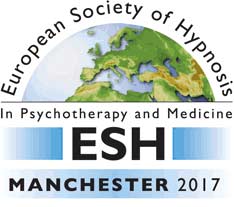Session 7
Both at the same time - How to treat ambivalence
Annette Fuerst
"I would like to take better care of myself but...." - Do you also often hear that sentence from your clients? Stuck in the ambivalence trap - and sometimes it’s not only our clients...
The reasons they come up with are very good. Their arguments might even lead to the therapist being caught in the same trap.
Torn between two sides - e.g. being "egoistic" or taking care of others. They think they have to decide. Either one way or the other. Right or left. 0 or 100. Caught in their system of beliefs, they try to solve the task to decide which way to go. Most of the time they choose to think it over and over again without coming to a solution. In the end they even feel torn between thinking and feeling.
What if there was a technique that provides the solution "both at the same time"? There is! In this workshop I will show a hypnotherapeutic approach combining an ideomotoric approach with time progression. There is no need to decide on one side! The ideomotoric component makes allowance for the inner pace of our client. Therefore the unconscious sends the signal when to start the time progression and experience a future with both aspects at the same time.
Metaphor, Mindfulness and Ericksonian Communication in the Healing Process
Liliana Cane
In this workshop we will explore the strategic Ericksonian communication techniques that create a fast, secure and trusting therapeutic relationship. By listening closely to our patient, we’ll identify their choice of metaphors in their expressing of their problem. This will be the base to establish the hypnotic healing relationship.
Metaphors are communicative events that convey different associations to the mind both for the client and the therapist. By listening carefully to the nature of the metaphors that clients use to describe their experience, and entering a creative dialogue that produces an expansion in consciousness, we will trigger hypnotic dissociative states, and convey therapeutic suggestions in a non-directive manner. This is the beauty of the Ericksonian approach to metaphor and hypnosis.
Mindfulness on the other hand, is a state of concentrated awareness of the present experience. It includes an attitude of curiosity, and a sense of relative emotional detachment from the inner experience. We will explore in which clinical situations this might be the treatment of choice.
These strategies, integrated with care and creativity enhance the hypnotic process of healing. In this two-hour workshop we will explore in detail the above elements, illustrated with different clinical vignettes (anxiety, depression, PTSD). This will be followed by a live demonstration and a discussion.
Rapid Hypnosis: A practical mastery workshop
Gabor Filo & Ashley Goodman
Today’s Twitter paced 140 character world has sped up psyches and expectations. Global healthcare economic realities, as well as profession specific characteristics have also robbed the clinician and more importantly the patients of the luxury of time. Protracted inductions, though of great value, in certain contexts may limit the clinical intervention rather akin to being stuck at the boarding gate and not en route in the air.
In this workshop the participant will be introduced to various rapid and instantaneous hypnotic inductions which can be modified for any profession, in any context, but will be of greatest value to hands-on healthcare providers. They will acquire an understanding of the prerequisites and the mechanics. Through group practice participants will acquire the skills for facile rapid inductions.
Participants will acquire new or refresh existing skills for Monday morning in their practices in this experiential workshop.
Silence falls upon the internet; Full Frontal Living
Susan Pinco, Tobi Goldfus, Eva Pollani
This panel will explore the ways that targeted utilization of and disconnection from the ever present stimulation of the internet can lead to increased connection to self and others; paving the way to full frontal living. This quartet of teachers from disparate cultures will engage the audience in a lively exploration of what is possible when we challenge the boundaries of “common” knowledge and invite the wisdom of uncommon practices to inform our work.
Tobi Goldfus: The use and “unuse" of digital devices
Eva Pollani: The creative power of boredom
Susan Pinco: The hidden potential of silence
Case Study Presentations: Integrative Hypnotherapy In Clinical Settings
Psychotherapy Institute in Turkey
PANEL ABSTRACT:
This panel focuses on the benefits of integrating hypnotherapy into psychotherapy practice.
ABSTRACT NAME WITH FIRST AUTHOR:
- Case Study: Changing Memories with Hypnotherapy - Erdem Akgun & Tahir Ozakkas
- Case Study: Use of Hypnotic Suggestibility in Psychosomatic Disorders - Erdem Akgun & Tahir Ozakkas
- Children’s Hypnosis used in Sibling Jealousy and Speech Impediment (Stuttering) Kevser Akgun & Tahir Ozakkas
Hypnosis for children with irritable bowel syndrome (IBS) or functional abdominal pain (FAP)
Carla Frankenhuis
Hypnosis brings lasting relief to children with IBS or FAP, a small study suggests.
Researchers led by Dr. Arine M. Vlieger, of St. Antonius Hospital in the Netherlands and Professor Dr. Marc Benninga of the Academic Medical Centre Amsterdam ,found that of 52 children with IBS or FAP,who had six hypnosis sessions with therapist, Carla Frankenhuis and practiced self hypnosis at home, two-thirds were free or mostly free of abdominal pain, compared to 20 percent of children who were given standard therapy alone.
The results were published in the American Journal of Gastroenterology.
Five years later, 68 percent of children in the hypnosis group were still largely free of abdominal pain, compared to 20 percent of children who received standard care.
The results of the last study have been published in 2017. In this study 260 children with IBS/FAP (8-18 years) had individual hypnotherapy with a therapist or home based treatment with cd’s.
This workshop will:
- Review and describe our clinical research in the efficacy of hypnosis for functional abdominal pain or irritable bowl syndrome.
- Present our current study
- Describe and demonstrate the protocol
- Give the participants an opportunity to practice
Vilma Trasarti Sponti
The workshop intend to illustrate how dependency relay on lack of belonging, which can be traced on various moment of lifetime cycle. Few slides will summarize the important concept of Belonging and Separating and how in hypnosis the therapeutic Rapport, and the attention to the bilateral minimal cues of the subject and of the therapist may allow us to understand better the problem and start to recuperate belonging. Many psychological problems starts out in adolescence such as Eating disorders, Drug addiction, Bullion behaviour, obsessive rituals etc. In maturity we can have Alcohol dependency, Compulsive shopping, Work- alcoholic, Money, Power, Success dependency, Love addiction and Jealousy. Workshop will more widely treat Love Addiction and Paranoid jealousy. Clinical cases, illustration and explanations of cases will complete it. Particular attention will be given to the problem of passing from the possessive concept of MY to the more fluent concept of expression of I emotion and reciprocity in relationship which include an I – You US in a equilateral triangle on which bases you can jump and dare to enjoy freedom Group exercises to work on the relevant subjects will be carried out .
Cases presented by participants can be considered
Questions and suggestions are welcome
A Group Hypnosis will close the workshop to leave us with capacity of turning any new experience in a suggestion of our own responsibility and freedom.
Unlock the hidden potential in alcohol addiction
Henriette Walter
The burden of alcohol addiction for men has reached the first place in Europe. Women are at place 3 of DALYs. In our department we offer in- and outpatient treatment, whereby the inpatient treatment aims at full abstinence (because of a more severe illness course) and the outpatient treatments (1 hrs daily from Monday to Friday) vary in their treatment goals. We step out from the idea that treatment goals have to be defined mutually, by the patient and the doctor.
Hypnotherapy can support the afflicted person in many ways. An outline of these possibilities will be presented. Examples that use these possibilities are: developing a suitable and mutual therapy goal, offering tailor made anti-craving strategies, using the fitting metaphors and asking during hypnosis precise questions, which show where the point of return might be found, where pitfalls are and what person/symbol could be a support. A hypnosis study on decrease of alcohol craving will be presented.
Group hypnotherapy for addiction: a dual-diagnosis approach
Denis Mirlesse
The study was conducted with 100 clients of a leading UK provider of drug and alcohol services. Participants were all enrolled in a 12-week abstinence programme. Levels of stress, depression and anxiety were repeatedly measured using a statistically valid and reliable self-assessment questionnaire. During the programme, a control group had weekly sessions of mindfulness-based relapse prevention, while the test group had weekly sessions of scripted hypnotherapy targeting co-morbid psychological conditions. Results showed that the test group achieved a significantly higher reduction in mood disorders than the control group. This study provides significant evidence in support of a dual approach for the diagnosis and therapeutic strategy of substance misuse and addictions, which should be considered in the UK.
The effect of hypnotherapy on Alcohol Dependence/ severe Alcohol Use Disorder
Irene Shestopal
The aim of this study was investigating the effect of hypnotherapy in severe AUD. It was conducted at Vangseter klinikk. Persons with AUD and other substance use disorders were admitted there for 6 weeks long inpatient treatment program, which consisted of extensive group therapy five days a week and one hour weekly of individual therapy, namely Motivational Interview. Hypnotherapy was offered to all the patients who suffered from AUD. 31 volunteers were randomised into a treatment and control groups. In the treatment group Motivational Interview was replaced with weekly hypnotherapy sessions. The treatment method was Ericksonian Hypnosis with focus on the positive resolution of the problems and conflicts, not only the ones related to alcohol. Anxiety, depression and other problems were addressed. Patients were visualizing the future, where they abstained from alcohol in a positive way. They imagined the ways to maintain the sobriety, when temptations were present. The treatment program was completed by December 2016. The endpoint of the study was a sustained reduction in alcohol consume. It will be measured by administering questionnaires during 2017. By August 2017 some preliminary results will be available.
What about dreams? Using hypnosis to explore dreams as metaphors of patient's resources. A Clinical Case Report
Fabio Carnevale
Are dreams hyper-significant symbolic productions? Are they dismantled warehouses of semiotic material? Or are they background noises of a standby brain locked into a temporary state of unconsciousness?
Whatever you think about dreams, it is quite common, in clinical experience, that patients tell us their dreams expressing an intense emotional participation.
Using hypnosis to modify, alter or deconstruct the integrity of the original novel dreams material - e.g. by inserting one or more foreign elements - is an effective tool to develop coping strategies, to build metaphors and design hypothesis in order to identify and utilize the patient’s unconscious inner potential.
This work, far from psychodynamic orthodoxy, offers a glimpse into the idea that dreams can offer the opportunity for building a therapeutic pathway that is constantly centered on the principles of naturalism, tailoring, and attention to patient’s resources.
A clinical case report will be discussed with a view to clarifying this theory.




